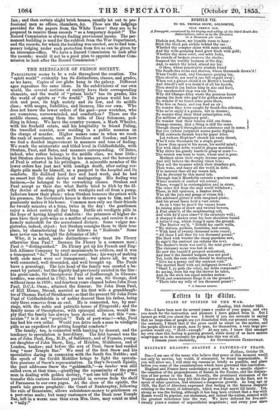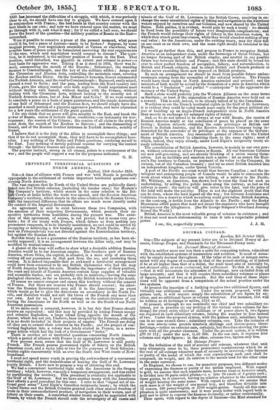MILITARY REASONS AGAINST A PITCHED-IIP PEACE.
Fulham, October 19. Sin—I am one of the many who believe that peace at this moment would not only be unwise, but would, if attempted be found impracticable. If you will allow me, I will state my reasons as briefly as possible, and place before you some of the considerations which have governed this conviction. England and France have undertaken a great war for a specific object—. the cessation of the preponderance of Russia in the Euxine, and the diminu- tion of her power in the East. Secretly, the prominent statesmen of the Western nations have long felt that the power of Russia in the East, not to speak of other, quarters, had attained a dangerous growth. As long ago as 1829, the Earl of Aberdeen expressed that feeling in the famous despatch relating to the treaty of Adrianople, which was kept secret till lately. Yet, strong as was the feeling, although it has long been evident that a war with Russia would be popular, our statesmen, and indeed the nation, entered with the greatest reluctance into the war. We have deferred for five-and- twenty years a contest of unparalleled magnitude ; and every year since
1829_ bas increased the difficulties of a struggle, with which, it was perfectly
clear to all, we should have one day to grapple. We have entered upon it in conjunction with France ; the best heads in that country concur with the best heads in our own; and now we have entered upon the matter, we must go through with it, cost what it may ; for if we called a halt now, we should leave the heart of the question—the military position of Russia in the East— untouched.
Were it possible to conceive a peace at the present moment, what peace
could it be, but a peace of Amiens—made to be broken ? Suppose, by some magical process, your negotiators assembled at Vienna or elsewhere, what possible bases of peace could be formulated answering the real requirements of the case, which said negotiators would consent to discuss ? The ques- tion, be it understood, is the military position of Russia in the East. 'That position, until disturbed, was gigantic in extent and colossal in power—a vast basis for aggressive war. Taking it as it stood in 1854, there was Is- mail, commanding the mouth of the Danube ; Sebastopol, the standing menace to Constantinople, and the key of the military edifice ; Anapa and the Circassian and Abasian forts, controlling the mountain coast, covering the Kouban and the Rhion. On the frontiers of Armenia, Gumri commanded the Turkish Armenia, and the road to Constantinople ; Bayazeed, easily seized, opened a road to Syria ; and the pass, leading from the Kurd country into Persia, gave the enemy control over both regions. Could negotiators meet without dealing with Ismail, without dealing with the Crimea, without dealing with the Circassian forts, without looking to the security not of Turkish Armenia alone, but of Asia Minor and Syria ? If we were content to conclude a peace on a basis of paper guarantees, and the simple destruction of one half of Sebastopol and the Russian feet, we should simply have dis- mantled a small portion of a gigantic aggressive position, and have adjourned for a few years the settlement of the great quarrel.
I for one think that no peace will give security to the East, and break the power of Russia, unless it include these conditions,—an indemnity for war- expenses ; the cession of the Crimea; the cession of all claim to the strip of coast from the mouth of the Kouban to Batoum - and the dismantling of Ismail, and of the Russian frontier fortresses in Turkish Armenia, notably of Gumri.
I believe that it is the duty of the Allies to accomplish these things; and that if we do not accomplish them, they will have to be accomplished here- after. I say nothing of the Baltic and Polish questions, confining myself to the East. I say nothing of merely political reasons for carrying the contest through : the military reasons are quite enough. The popular instinct, strong in all classes, points to a continuance of the war ; and the people will support a war for the purposes indicated. G. H.



































 Previous page
Previous page